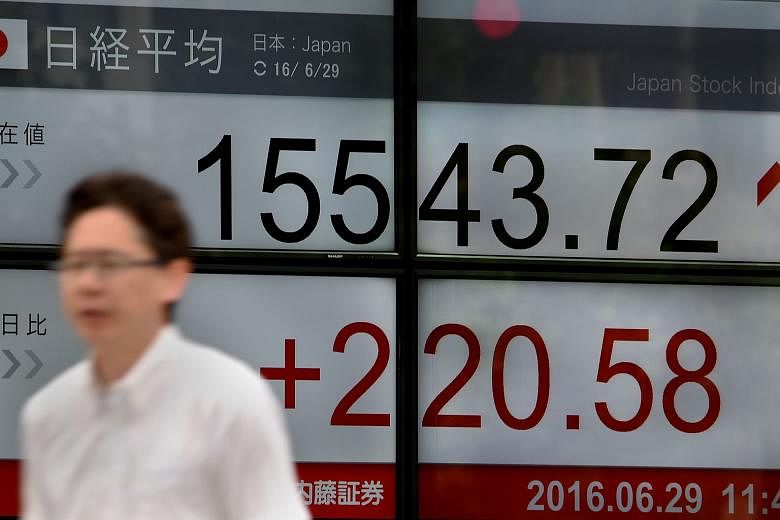TOKYO (REUTERS) - Asia stocks rose on Thursday (June 30), tracking an overnight rally on Wall Street, while the safe-haven Japanese yen retreated as global markets regained a semblance of calm after last week's Brexit shock.
MSCI's broadest index of Asia-Pacific shares outside Japan rose 0.4 per cent, pulling further away from a one-month low on Friday when it plunged more than 3 per cent in reaction to Britain's decision to leave the European Union.
Australian stocks added 0.3 per cent and Japan's Nikkei climbed 1.2 per cent.
Overnight, the Dow had risen 1.6 per cent while Britain's FTSE rallied for the second day, retracing all the losses suffered in reaction to Brexit.
US President Barack Obama said on Wednesday he expects the world economy will be steady in the short run after Britain's decision but expressed concern about longer-term global growth.
Still, expectations that major central banks will go easier on monetary policy in anticipation of another hit to global growth due to Brexit have buoyed risk assets globally.
Analysts also saw the recent plunge in sovereign debt yields as a factor driving investors to equities.
"While the full consequences of Brexit are still uncertain, the one thing it has accomplished very successfully is dropping global bond yields to new lows and keeping global monetary policy looser for longer," wrote Angus Nicholson, market analyst at IG in Melbourne. "Negative yielding government debt has surged.. .in such a situation, the drive for yield has never been stronger, which has seen people piling into dip-buying with little thought for the fundamental picture."
German and Japanese benchmark 10-year government debt yields have both fallen to historic lows below zero over the past week. Irish, French and Dutch 10-year yields declined to record troughs on Wednesday, all approaching zero.
The 30-year US Treasury yield, while still positive, has approached record lows as well.
Bargain hunting, meanwhile, took battered currencies such as sterling off multi-decade lows. The pound was last up 0.2 per cent at US$1.3450, putting further distance between a 31-year trough of US$1.3122 touched on Monday.
The euro, another casualty in the days after Brexit, traded at US$1.1125 after reaching US$1.0912 on Friday, its lowest since March.
The safe-haven yen marched in the opposite direction as risk aversion eased. The dollar was up 0.1 per cent at 102.935 yen after sliding to 99.00 on Friday, a trough last seen in November 2013.
The Australian dollar, sensitive to shifts in risk sentiment, was steady at US$0.7457 after bouncing 1.8 per cent over the past two sessions.
In commodities, precious metals rose in part to a weaker dollar, although the gains also highlighted underlying investor appetite for safe assets amid longer-term financial uncertainty after Brexit.
Silver rose to a 1-1/2-year high, while platinum and palladium each rallied more than 3 percent on Wednesday. Spot gold stood little changed at US$1,315.91 an ounce after rising 0.5 per cent overnight - it had rallied to US$1,358.20 on Friday, its highest in more than two years.
US crude was slightly lower at US$49.51 a barrel after jumping more than four per cent overnight thanks to a larger-than-expected drawdown in US crude inventories.
Oil has mostly recovered what it lost after the Brexit shock.

